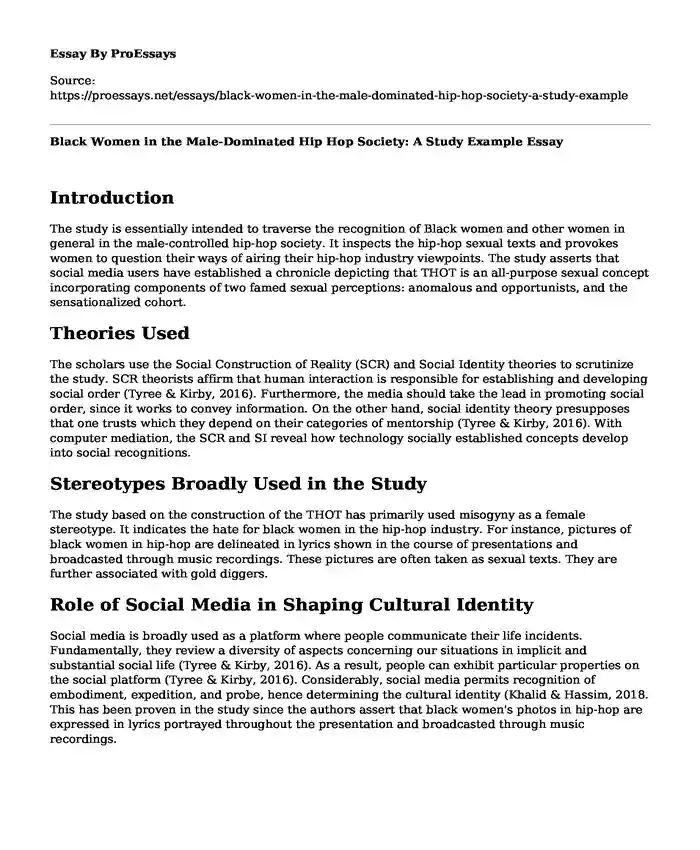Introduction
The study is essentially intended to traverse the recognition of Black women and other women in general in the male-controlled hip-hop society. It inspects the hip-hop sexual texts and provokes women to question their ways of airing their hip-hop industry viewpoints. The study asserts that social media users have established a chronicle depicting that THOT is an all-purpose sexual concept incorporating components of two famed sexual perceptions: anomalous and opportunists, and the sensationalized cohort.
Theories Used
The scholars use the Social Construction of Reality (SCR) and Social Identity theories to scrutinize the study. SCR theorists affirm that human interaction is responsible for establishing and developing social order (Tyree & Kirby, 2016). Furthermore, the media should take the lead in promoting social order, since it works to convey information. On the other hand, social identity theory presupposes that one trusts which they depend on their categories of mentorship (Tyree & Kirby, 2016). With computer mediation, the SCR and SI reveal how technology socially established concepts develop into social recognitions.
Stereotypes Broadly Used in the Study
The study based on the construction of the THOT has primarily used misogyny as a female stereotype. It indicates the hate for black women in the hip-hop industry. For instance, pictures of black women in hip-hop are delineated in lyrics shown in the course of presentations and broadcasted through music recordings. These pictures are often taken as sexual texts. They are further associated with gold diggers.
Role of Social Media in Shaping Cultural Identity
Social media is broadly used as a platform where people communicate their life incidents. Fundamentally, they review a diversity of aspects concerning our situations in implicit and substantial social life (Tyree & Kirby, 2016). As a result, people can exhibit particular properties on the social platform (Tyree & Kirby, 2016). Considerably, social media permits recognition of embodiment, expedition, and probe, hence determining the cultural identity (Khalid & Hassim, 2018. This has been proven in the study since the authors assert that black women's photos in hip-hop are expressed in lyrics portrayed throughout the presentation and broadcasted through music recordings.
Additional Thoughts
Black women and general women have always done well in the music industry, including rapping. However, power chronicles have made those responsible for discouraging them disapprove of their necessary credits. For instance, those in charge assume that there exist specific requirements, which women must satisfy to attract ratification. Their male counterparts are, however, not pressured to adhere to equivalent standards.
References
Khalid, N. L., Jayasainan, S. Y., & Hassim, N. (2018). Social media influencers-shaping consumption culture among Malaysian youth. In SHS Web of Conferences (Vol. 53, p. 02008). EDP Sciences.
Tyree, T. C., & Kirby, M. D. (2016). The construction of the THOT female sexual stereotype in social media. Social Media: Culture and Identity, 1.
Cite this page
Black Women in the Male-Dominated Hip Hop Society: A Study Example. (2023, Nov 28). Retrieved from https://proessays.net/essays/black-women-in-the-male-dominated-hip-hop-society-a-study-example
If you are the original author of this essay and no longer wish to have it published on the ProEssays website, please click below to request its removal:
- Essay Example on Violence in the Media
- Sociology Essay Sample: Why Teenagers Use Drugs?
- Movie Review Example: The Beasts of the Southern Wild
- The Influence of Social Media on Teen's Self Esteem Paper Example
- Essay Example on Strip Clubs: A Male-Dominated World of Commercial Sex Work
- Puma: 70 Years of Sports Style & Performance - Essay Sample
- Article Review Sample on Culture, Power & Hegemony: Gramsci's Influence on Lear's Argument







